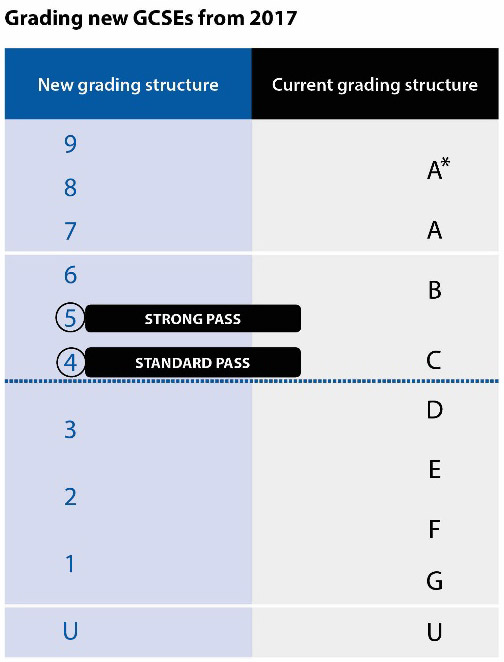GCSE Changes
GCSEs have changed in recent years….
Why have GCSEs in England changed?
We are committed to driving the highest standards in schools. That’s why we have revised our GCSE qualifications in England to make them more demanding. We have done this so our young people have the knowledge and skills they need to succeed in 21st century Britain, and to match those of their peers in high-performing education systems elsewhere in the world.
The new, more challenging GCSEs will help young people develop the skills that employers tell us they need.
When did they change?
From August 2017, the new qualifications will start to be awarded with number grades, rather than letters. The new grading scale runs from 9 to 1 instead of A* to G, with 9 the highest grade.
Not all GCSEs are changing at once – English language, English literature and maths are changing first, with students sitting these exams this summer. By 2020, all GCSEs in England will be reformed and graded using numbers instead of letters. However, most GCSEs taken by students at schools in Wales and Northern Ireland will continue to be graded A* to G.
Why has the grading scale changed?
The new scale is intended to recognise more clearly the achievements of high-attaining students.
Changing from letters to numbers will also allow anyone – for example an employer – to see easily whether a student has taken a new, more challenging GCSE, or an old GCSE.
What is the impact be on grades?
 The old and new GCSE grading scales do not directly compare but, as the diagram below shows, there are three points where they align:
The old and new GCSE grading scales do not directly compare but, as the diagram below shows, there are three points where they align:
- The bottom of grade 7 is aligned with the bottom of grade A;
- The bottom of grade 4 is aligned with the bottom of grade C; and
- The bottom of grade 1 is aligned with the bottom of grade G.
Although the exams will cover more challenging content, this won’t mean students get a lower grade than they might have under the old system. Ofqual, the exams regulator, will ensure that broadly the same proportion of students will get grades 1, 4 and 7 and above in any subject as would have got grades G, C or A and above respectively in the old system, other things being equal. However, the highest grade – 9 – will be awarded to fewer students than a current A* as it represents a higher standard.
What is considered as a “standard” or “strong” pass?
The Department for Education will recognise grade 4 – broadly the equivalent of the bottom two thirds of a current grade C – as a “standard pass”. This is the minimum level that students need to reach in English and maths: otherwise they will need to continue to study these subjects as part of their post-16 education. There is no re-take requirement for other subjects.
The Department will recognise a GCSE grade 5 or above as a “strong pass”. The proportion of students achieving at least a grade 5 in English and maths will be one of the headline performance measures for schools, reflecting our ambition to raise standards in schools. This is in line with the expectations of top performing education systems around the world.
The new qualifications have been designed to ensure young people have the knowledge and skills they need and meet the needs of employers, universities and colleges, who will continue to set the GCSE grades they require for employment or further study.
Find out more about how the reforms will affect you… If you're a student or a parent
You may be wondering how this will affect you/your child’s results and options for continuing in education or finding work.
You probably already have predicted grades that use the new grading scale, or have already begun sitting exams in the new GCSEs this summer, so hopefully it's becoming more familiar to you.
Colleges, universities and employers will continue to set their own entry criteria, and we are working with these groups to make sure that they understand the new grading scale.
If you have any questions about your future options, we recommend you consult the UCAS website, the National Careers Service, or speak directly to your school.
You can follow GCSE grades 9 to 1 on Facebook.
We have also developed this factsheet, which we hope you find helpful.
